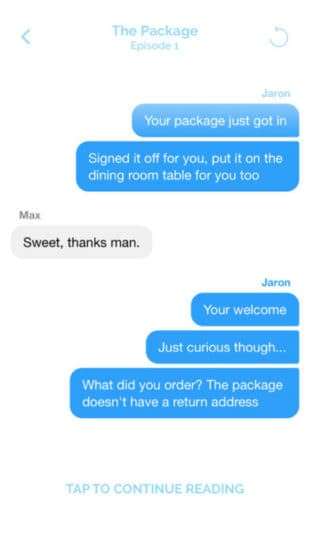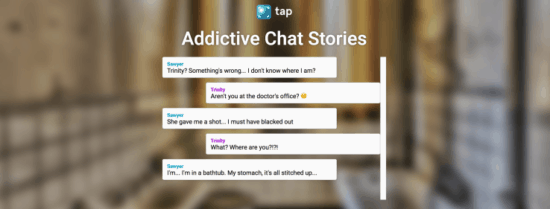If you’ve ever heard of chat fiction, chances are, you’ve got a teenager. Think about it like this: e-books were the new alternative to paperbacks, and chat fiction is the new alternative to e-books. Instead of just putting paperbacks into digital format, chat-fiction are stories, but told in text message format. The idea is that because the text format is more familiar to the teenagers and pre-teens of today who grew up texting, then having a book or a story in text message format will encourage them to read more – and surprisingly, it’s working.

Image courtesy of Lure at itunes.apple.com
The original chat-fiction app was Hooked, available for $2.99 per week. The app launched in 2015, and has remained popular since, with an ever-growing fan base. Hooked, which is all thriller-based stories, inspired Yarn, another chat-fiction app but with different themes, one of which is where you can drop-in on and overlook fictional texts between different celebrities. Now, there are a whole host of different chat-fiction apps. Hooked and Yarn, though, are the main go-tos, as they’ve both consistently gained more users, and their ratings have always been high.
Exciting for the readers, it’s also exciting for the writers. In an interview with CBS News, Kayla Parent, who writes for Hooked, said, “The biggest challenge was coming up with a story that kind of fit the parameters of this style of writing.” The text message format challenges the writers to think differently about how to write a story.

The real question, though, is what chat-fiction apps mean for the publishing industry. Telepathic, the company that produced Hooked, says on their website, “We believe there is a billion-dollar opportunity in bringing “lean” principles to the development and distribution of mass-market fiction, and in presenting stories as a mobile-first experience.” While this may be the goal, and there’s no denying that chat-fiction has had an impact on teenagers in terms of reading, the comparisons to Wattpad, an online reading site, may not be all that good. Wattpad actually launched Tap, a chat-fiction app, earlier this year, which has become incredibly popular; but Wattpad itself has had problems in the past when it comes to original content.
Online, many people write original content using the platform of livejournal.com, for example. But, a common complaint among livejournal users is that their original stories have been posted onto Wattpad, without their permission. This would be a problem for those on chat-fiction apps writing original content, especially if chat-fiction is trying to make an impact on the publishing industry, where copyright laws and contracts are an essential element.
No matter what we think about chat-fiction, online writing platforms or the publishing industry, each offers a new foundation for writers and readers to explore, and create communities. Chat-fiction may make the situation more realistic for many readers, but the stories will never be able to replace the kind of context and depth of description and scene that we find in books. As teenagers mature, they may grow out of just reading and enjoying the text message format. As for whether or not the chat-fiction industry will take over the publishing world, that will remain to be seen.
Interested in becoming a writer? Take a look at our Writers-in-Residence program!





I’m actually writing a chat fiction.